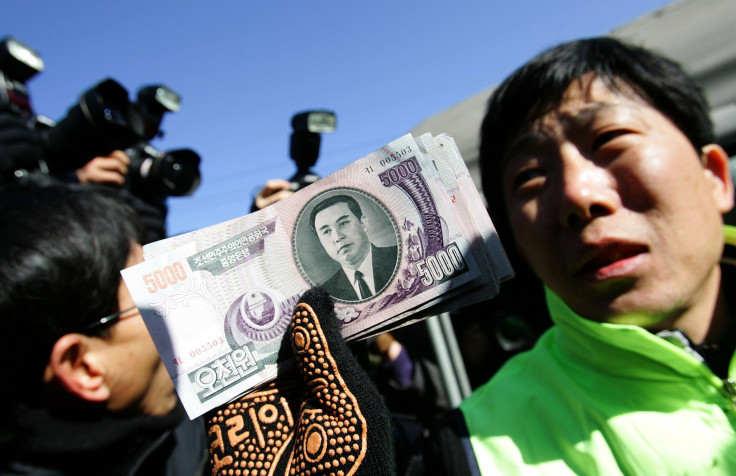North Korea News: Kim Jong Un Threatened Again By Mystery Rebel Group

Dozens of North Korean currency bills surfaced bearing slogans disparaging leader Kim Jong Un in the country's northernmost province, South Korea-based media outlet Daily NK reported Monday, citing sources within North Korea. The news came following reports of anti-Kim leaflets and an alleged decline in popularity for the young head of state.
Anti-government messages such as "Overthrow Kim Jong Un" and "Punish Kim Jong Un" were reportedly scrawled over images of the leader's grandfather and founder of the state Kim Il Sung, whose face adorns the 5,000 North Korean won (KPW) bills. The bills were scattered across the streets of downtown Hoeryong City, North Hamgyong Province, a popular commercial area located less than a mile from the Chinese border. Security forces apparently removed the currency immediately after discovering it around 5:30 a.m. and launched thorough investigations in an attempt to determine who was behind the act of political dissidence against the authoritarian state.
The news followed previous reports of anti-government leaflets and graffiti popping up in Pochon County, Ryanggang Province and Chongjin City, North Hamgyong Province, where sources said authorities were already interrogating the population, restricting movement and conducting handwriting tests. Sources also suggested these incidents may be part of a growing dissatisfaction with Kim among the citizens of North Korea, a country in which public acts of criticism against the government are rare and met with harsh punishment.
“It appears that the intention is to simultaneously criticize the Suryong (Kim Il Sung) and the Supreme Leader (Kim Jong Un). Getting caught would invite extreme punishment for the perpetrator, as the individual and three generations of their family would be put to death for political crimes,” a source in Ryanggang Province told Daily NK.
Since succeeding his late father, Kim Jong Il, in 2011, the 32-year-old leader is believed to have executed up to 70 government officials, a number of them members of North Korea's older, military elite including former Defense Chief Hyon Yong Chol and Kim's own uncle, Jang Song Thaek. While information coming from the reclusive state was nearly impossible to verify, the combination of an internal power struggle, international sanctions related to North Korea's aggressive nuclear program and what Human Rights Watch has called an "appalling human rights record," has led to speculation over Kim's future.
© Copyright IBTimes 2024. All rights reserved.





















